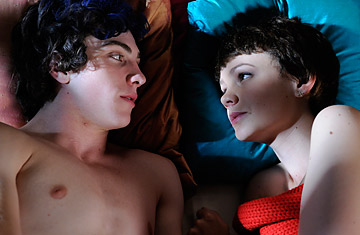
Aaron Johnson and Carey Mulligan in The Greatest
Susan Sarandon has had a rough go of it as a mother on screen. She lost daughters in Moonlight Mile and Little Women, a soldier son in In the Valley of Elah and in Lorenzo's Oil fought valiantly to save her terminally ill child's life. It's no wonder that the overwrought film The Greatest, which features Sarandon as mother coping with the death of her 18 year-old son Bennett (Aaron Johnson), feels so familiar; mad, sad mothers represent a large part of her filmography.
As Grace Brewer she is brittle, crazed with grief and absolutely unable to cope, unlike her math professor husband Allen (Pierce Brosnan), who would like her to at least allow the maid to pick their son's dirty socks up off the floor. (Writer/director Shana Feste has made the Brewers rich, and you can almost hear her pitch to the studio, filled with longing for the profound: "See, they had everything, but now, without Bennett, nothing.") All the Sarandon grief moves are there: the defiant head lift, the wide, wet eyes, the clenched fists, the accusations hurled at Allen for his lack of emotion; The Greatest often feels like a mash-up of Sarandon's greatest grief hits.
She's not helped by Feste's screenplay, which presents Grace as someone irrationally fixated on the minutiae of Bennett's death. Seventeen minutes elapsed between the moment Bennett's Karmann Ghia got T-boned by a pick-up truck at an intersection and his time of death. Grace wants desperately to know about those 17 minutes — but not about the hours her son spent immediately before the accident, having the greatest night of his life consummating a love for longtime high-school crush Rose (Carey Mulligan) — a girl to whom he had never dared speak until that last day.
Aaron Johnson doesn't get to make much of an impression as Bennett (watch for his breakthrough role later this month in Kick-Ass) but if you could picture the girl you'd most like to turn up on your doorstep, announcing she's pregnant with your dead son's child, it would be Mulligan's Rose. Despite an absent father and a mother in rehab, Rose is poised, mature and smart enough to have won a full scholarship to Barnard. This movie lacks the energy and verve of An Education, the coming-of-age drama that catapulted the British actress to an Oscar nomination last year. But with her sweet solemnity, Mulligan gives it some weight. She and Brosnan have a lovely rapport; when Rose tells Allen that she thinks Bennett was the "love of her life," it might be the saddest moment in the film.
While Rose's belly expands, Grace camps out at the bedside of Jordan (Michael Shannon), the comatose driver of the pick-up, an apparent low-life with warrants out for his arrest. She reads to him, fusses over him and orders his nurses around. When conscious, Shannon is so consistently lively and interesting (see Bug and Revolutionary Road) that we too hope he wakes up, if only to tell Grace she's lost her mind. She refuses to feel any pleasure over the impending arrival of her grandchild. "I don't want everybody thinking we're blessed," she hisses to Allen.
Undeniably, grieving people do crazy, melodramatic things. But Sarandon here is unfairly saddled with unsympathetic actions; indeed, she's turned into what amounts to the villain of the piece. Grace is mean to Rose, oblivious to her other son, the pill-popping Ryan (Johnny Simmons from Hotel for Dogs) and cold and cutting to Allen. But unlike the mother figure played by Mary Tyler Moore in Ordinary People, Grace isn't really cold. We know she'll come around eventually — this isn't a movie with tricks up its sleeve — and the wait grows tedious.
They say comedy is the hardest genre to pull off, but to my mind, the grief drama is the most miserable beast to take on (think how the mighty Peter Jackson got mired in it in The Lovely Bones). If there's no romance to counter the loss, the box office tends not to be boffo (as with Nick Cassavetes' 2009 My Sister's Keeper which may have infuriated as many people as it moved). In theory, losing someone you love shouldn't be any less universal than finding someone to love, but it tends to be such an inwardly focused experience — most of us just hole up in pajamas and mope — that it's an enormous challenge to portray on film without teetering into the mawkish. Which unfortunately, is just what The Greatest does.
